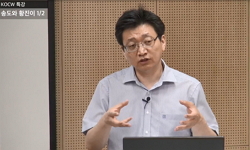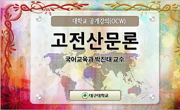There are many historical novels. Historians want a novelist to study a lot of sources and to think with different views correctly and synthetically about his or her material when he or she write a historical novel; the novelist can express appropriat...
http://chineseinput.net/에서 pinyin(병음)방식으로 중국어를 변환할 수 있습니다.
변환된 중국어를 복사하여 사용하시면 됩니다.
- 中文 을 입력하시려면 zhongwen을 입력하시고 space를누르시면됩니다.
- 北京 을 입력하시려면 beijing을 입력하시고 space를 누르시면 됩니다.

역사가 입장에서 보는 역사소설과 사료 해석 = Historical Novel and Representing Historical Records in view of a Historian ( Hwang Jin- ee written by Hong, Seok-joong)
한글로보기https://www.riss.kr/link?id=A76297620
- 저자
- 발행기관
- 학술지명
- 권호사항
-
발행연도
2006
-
작성언어
Korean
-
주제어
황진이 ; 역사소설 ; 혁명전통 ; 주체사상 ; 이인(異人) ; Hwang ; Jin-ee(黃眞伊) ; Historical Novel ; Revolutionary Tradition ; Juche Ideology(主體思想) ; Eein
-
KDC
810
-
등재정보
KCI등재
-
자료형태
학술저널
-
수록면
49-77(29쪽)
- 제공처
-
0
상세조회 -
0
다운로드
부가정보
다국어 초록 (Multilingual Abstract)
There are many historical novels. Historians want a novelist to study a lot of sources and to think with different views correctly and synthetically about his or her material when he or she write a historical novel; the novelist can express appropriately about the traditional features and typical characters through the process.
Hwang Jin-ee( 黃眞伊) by Hong, Seok-joong(洪錫中) in North Korea is an excellent historical novel in this view.
There are four original historical records about Hwang Jin-ee but Chinese poetry and shijoes(Korean odes; a kind of short lyric poem). But only three are left which show the thought of the time. The first of them is Eouyadam(於于野談; a historical romance) by Yu Mong-in(柳夢寅), which was written before the other two. Yu Mong-in, who was an administer, found Hwang Jin-ee's activism beyond any restriction and her self-realization. She was a different person. One of the other two is Songdokiee(松都奇異) by Lee, Deok-hyeong(李德泂), and the last is Chisorok(識小錄) by Heo, Kyoon(許筠). Lee, Deok-hyeong was a leader to form the main family of the gentry in Korea and he was caught Ms. Hwang's traditional beauty and a kisaeng's charm and aroma. Heo Kyoon who had a revolutionary temperament described her as an 'Eein(異人)' which means outstanding heroine. Without these, we have Songdoinmulchi which was written by Kim, Taeg-yeong(金澤榮, a Neo Confucianist) long after above three but many choose it to read. He gave warning of Ms. Hwang's action for herself from a patriarchism.
Mr. Hong's Hwang Jin-ee didn't refer to Eouyadam by Yu Mong-in but chose Songdoinmulchi by Kim Taeg-yeong among the above references. This shows that he wanted to portray her kisaeng's life in ruled class prior to her self-realization. So we can tell the novel as a ‘Kisaeng Story'.
Mr. Hong designed the common people who went to ruin as a pivot. Hwang Jin-ee's life represents the common ruined and their resist. This is for their relationship with the revolutionary tradition.
Ms. Hwang has a gigolo who's called Nomi. Their relationship is destiny and the relations appear in the beginning, the middle, and the end. We can understand the Nomi is important as its heroine.
Ms. Hwang's father is a noble(兩班) in origin, but her mother is a female slave, so she becomes a humble person in this novel. Nomi is a lowly man as a male slave originally but he appears as a common(平民). He is a son whose father has no his land and make money by a daily labor as a gogong(雇工). But his parents abandoned him(遺棄兒), so he is a roamer and becomes steward for the house of Mr. Hwang(Jinsa: a successful candidate in the secondary grade civil service examination). He is disappointed in the failure with Ms. Hwang and he leaves the house to become a leader of bandits and is put to death.
Mr. Hong's Hwang Jin-ee was born in North Korea. The North Korea's historical school accept the popular resistance in the line of modern revolutionary tradition. A gang becomes a set of bandits, and the farmer's war which rose in Pyongan-do with leading of Hong Kyong-rae in 1811, resistances against Western invasions, Palchisan movement, and the North Korea's 'Juche (self-reliance) ideology(主體思想)' are followed. Nomi is a typical in the beginning of revolutionary tradition based on this 'Juche ideology'.
Mr. Hong's Hwang Jin-ee is on the literary tradition of Lee Tae-joon's Hwang Jin-ee. And this historic novel is based on 'the revolutionary tradition' not based on 'the national cultural heritage' which are North Korea's two main pivots.
So we can find some shortages. The first and the biggest is Mr. Hong's Hwang Jin-ee didn't see Chisorok by Heo Kyoon and didn't represent her outstanding character as an 'Eein'. The 'Eein' was the opposition of ‘Kunja(君子, a true gentle class)', but he or she is accepted as an important character because his or her accomplishment for subversion of a main community. Another shortage is Mr. Hong didn't represent her 'angelic beauty b
목차 (Table of Contents)
- 1. 들어가는 말-문학적 진실과 역사적 진실의 합일 문제
- 2. 황진이 관련 원 사료의 다양한 관점들
- 3. 홍석중 《황진이》에 나타나는 특징-주체사관의 영향
- 4. 사료에는 보여지지만, 황진이 관련 소설에서는 재해석되지 않은 부분들
- 참고문헌
- 1. 들어가는 말-문학적 진실과 역사적 진실의 합일 문제
- 2. 황진이 관련 원 사료의 다양한 관점들
- 3. 홍석중 《황진이》에 나타나는 특징-주체사관의 영향
- 4. 사료에는 보여지지만, 황진이 관련 소설에서는 재해석되지 않은 부분들
- 참고문헌
- 영문초록
동일학술지(권/호) 다른 논문
-
한국 현대 소설에 나타나는 생태위기 양상의 사회생태론적 연구
- 한국현대문학회
- 구자희(Koo Za-hee)
- 2006
- KCI등재
-
- 한국현대문학회
- 김윤정(Kim Yun-jeong)
- 2006
- KCI등재
-
- 한국현대문학회
- 장사선(張師善)
- 2006
- KCI등재
-
- 한국현대문학회
- 이동하(Yi Dong-ha)
- 2006
- KCI등재




 DBpia
DBpia




